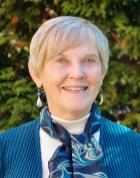By Virginia Cooke
My Poetry Month Choices: “The Bishop Orders his Tomb from St. Praxed’s Church,” “Of Modern Poetry,” “Gesture,” and “Postscript”
This assignment is very difficult because I have so many “favourites” for so many reasons. Here are four of them.
1) “The Bishop Orders his Tomb from St. Praxed’s Church” by Robert Browning
Because drama is my first love, I really delight in dramatic monologues, and especially those that feature strong characters. “Fra Lippo Lippi” and “My Last Duchess” are other Browning poems which fall into this category. I take such pleasure in hearing the voice, figuring out the circumstances, envisioning the scene. In this case, the bishop, from his death bed, is so deliciously corrupt and filled with petty jealousy. Ironically, I think Browning must have been thinking of all the seven deadly sins when he conjured up this character. Browning’s consummate skill in handling the blank verse while giving his character such a “natural” voice is remarkable.
2) “Of Modern Poetry” by Wallace Stevens and 3) “Gesture” by Donald Finkel
I am fascinated by poems about poetry. I have a whole set of them that I re-read (and often assign to students, hoping they will be equally attracted). I offer two here because one (Finkel’s) is so playful, whereas the other (Wallace Stevens’s) is more theoretical. But both involve the reader in reflection about what it means to be a reader of poetry: “an invisible audience listens, /Not to the play, but to itself.”
Of Modern Poetry
The poem of the mind in the act of finding
What will suffice. It has not always had
To find: the scene was set; it repeated what
Was in the script.
Then the theatre was changed
To something else. Its past was a souvenir.
It has to be living, to learn the speech of the place.
It has to face the men of the time and to meet
The women of the time. It has to think about war
And it has to find what will suffice. It has
To construct a new stage. It has to be on that stage,
And, like an insatiable actor, slowly and
With meditation, speak words that in the ear,
In the delicatest ear of the mind, repeat,
Exactly, that which it wants to hear, at the sound
Of which, an invisible audience listens,
Not to the play, but to itself, expressed
In an emotion as of two people, as of two
Emotions becoming one. The actor is
A metaphysician in the dark, twanging
An instrument, twanging a wiry string that gives
Sounds passing through sudden rightnesses, wholly
Containing the mind, below which it cannot descend,
Beyond which it has no will to rise.
It must
Be the finding of a satisfaction, and may
Be of a man skating, a woman dancing, a woman
Combing. The poem of the act of the mind.
~ Wallace Stevens
Gesture
My arm sweeps down
a pliant arc
whatever I am
streams through my
negligent wrist:
the poem
uncoils
like a
whip, and
snaps
softly an inch from your enchanted face.
~ Donald Finkel
4) I’ve recently been teaching poetry both by W.B. Yeats and Seamus Heaney, and there would be no end to favourites here. In fact, I’m not even sure where to start. But here is a brief poem which Heaney places right at the end of Opened Ground. I love the way it not only captures landscape, but brings that landscape inside—so much so that I actually tear up every time I read the ending.
Postscript
And some time make the time to drive out west
Into County Clare, along the Flaggy Shore,
In September or October, when the wind
And the light are working off each other
So that the ocean on one side is wild
With foam and glitter, and inland among stones
The surface of a slate-grey lake is lit
By the earthed lightening of flock of swans,
Their feathers roughed and ruffling, white on white,
Their fully-grown headstrong-looking heads
Tucked or cresting or busy underwater.
Useless to think you’ll park or capture it
More thoroughly. You are neither here nor there,
A hurry through which known and strange things pass
As big soft buffetings come at the car sideways
And catch the heart off guard and blow it open.
~ Seamus Heaney


Comments are closed.